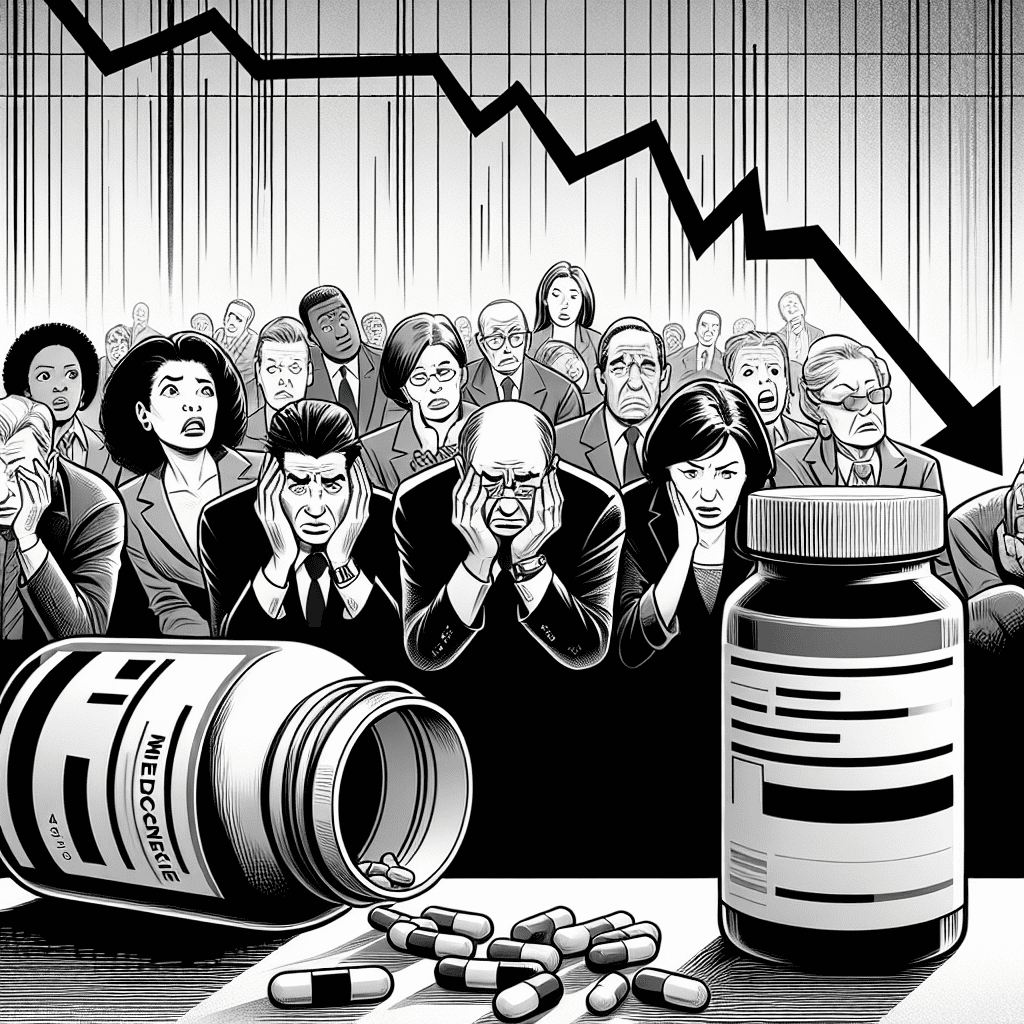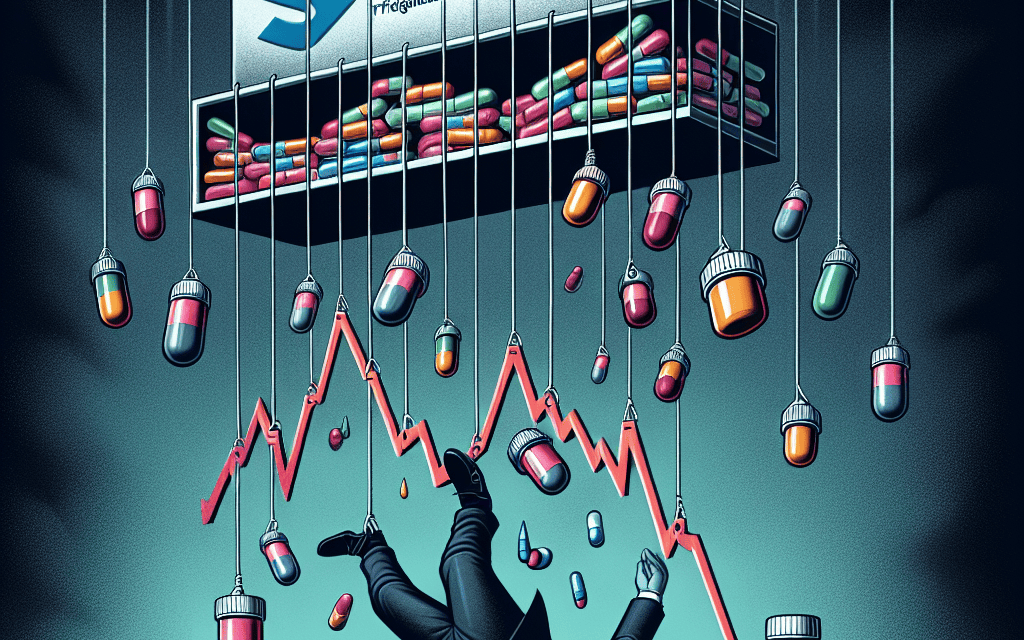“Apellis Pharmaceuticals Faces Setback: Syfovre Sales Fall Short, Impacting Market Confidence”
Introduction
Apellis Pharmaceuticals recently faced a significant downturn as its stock plummeted following the release of disappointing sales figures for its eye treatment, Syfovre. The company’s financial performance fell short of market expectations, raising concerns among investors and analysts about the commercial viability of the drug. Syfovre, which was anticipated to be a key growth driver for Apellis, failed to achieve the projected sales targets, leading to a sharp decline in investor confidence. This development has prompted a reevaluation of the company’s strategic direction and its ability to compete in the highly competitive pharmaceutical market.
Impact Of Syfovre Sales On Apellis Pharmaceuticals’ Market Position
Apellis Pharmaceuticals recently faced a significant setback as its stock value plummeted following the release of disappointing sales figures for its much-anticipated drug, Syfovre. This development has raised concerns about the company’s market position and its future prospects in the competitive pharmaceutical industry. The underwhelming sales performance of Syfovre, a treatment designed for geographic atrophy, a leading cause of blindness, has not only affected investor confidence but also cast a shadow over Apellis’s strategic plans.
Initially, Syfovre was heralded as a potential game-changer in the treatment of geographic atrophy, a condition for which there are limited therapeutic options. The drug’s approval was seen as a significant milestone for Apellis, promising to bolster its market presence and drive substantial revenue growth. However, the reality has fallen short of expectations, as the sales figures have not met the optimistic projections set by analysts and the company itself. This shortfall can be attributed to several factors, including market competition, pricing strategies, and perhaps an overestimation of the drug’s immediate market penetration.
The competitive landscape in the pharmaceutical industry is notoriously fierce, and Apellis’s experience with Syfovre underscores this reality. Other companies have been quick to develop and market alternative treatments, which may have diluted Syfovre’s impact. Moreover, the pricing strategy employed by Apellis may have also played a role in the drug’s lackluster sales. In a market where cost-effectiveness is a critical consideration for both healthcare providers and patients, the pricing of Syfovre might not have been as competitive as necessary to capture a significant market share.
Furthermore, the initial excitement surrounding Syfovre may have led to an overestimation of its market potential. While the drug addresses a critical unmet need, the adoption rate among healthcare providers and patients may have been slower than anticipated. This could be due to a variety of reasons, including the need for more extensive education and awareness campaigns to highlight the drug’s benefits and differentiate it from existing treatments.
The impact of Syfovre’s disappointing sales on Apellis Pharmaceuticals extends beyond immediate financial concerns. The company’s market position, which was expected to strengthen with the success of Syfovre, now faces challenges. Investor confidence has been shaken, as evidenced by the sharp decline in stock value. This, in turn, could affect Apellis’s ability to secure funding for future research and development initiatives, potentially stalling other projects in its pipeline.
In response to these challenges, Apellis may need to reassess its strategic approach. This could involve revisiting its pricing strategy, enhancing marketing efforts to better communicate the benefits of Syfovre, and exploring partnerships or collaborations to expand its reach. Additionally, the company might consider diversifying its portfolio to reduce reliance on a single product and mitigate risks associated with market fluctuations.
In conclusion, the disappointing sales of Syfovre have undeniably impacted Apellis Pharmaceuticals’ market position, highlighting the complexities and challenges inherent in the pharmaceutical industry. As the company navigates this setback, it will need to employ strategic measures to regain investor confidence and secure its place in the market. The lessons learned from this experience could ultimately guide Apellis toward more sustainable growth and innovation in the future.
Analyzing The Financial Implications Of Apellis’ Recent Sales Report
Apellis Pharmaceuticals recently faced a significant setback as its stock plummeted following the release of disappointing sales figures for its flagship drug, Syfovre. This development has sent ripples through the financial community, raising concerns about the company’s future prospects and its ability to meet investor expectations. The underwhelming sales performance of Syfovre, a treatment for geographic atrophy secondary to age-related macular degeneration, has prompted a reevaluation of Apellis’ market strategy and financial health.
To understand the financial implications of this downturn, it is essential to first consider the context in which Syfovre was launched. The drug was highly anticipated, with analysts projecting it to be a significant revenue driver for Apellis. Geographic atrophy is a progressive eye disease with limited treatment options, and Syfovre was expected to fill a critical gap in the market. However, the initial sales figures have fallen short of these expectations, leading to a sharp decline in investor confidence.
The disappointing sales can be attributed to several factors. Firstly, the competitive landscape for ophthalmic treatments is intensifying, with several pharmaceutical companies vying for market share. This has made it challenging for Syfovre to establish a strong foothold. Additionally, the high cost of the drug may have deterred some potential patients and healthcare providers, further impacting sales. Moreover, the complexities involved in the drug’s administration and the need for regular monitoring may have also contributed to its lukewarm reception.
As a result of these challenges, Apellis’ financial outlook has been significantly affected. The company’s stock price has experienced a steep decline, eroding shareholder value and raising questions about its long-term viability. This downturn has also put pressure on Apellis to reassess its financial strategy and explore ways to regain investor trust. In response, the company may need to consider cost-cutting measures, strategic partnerships, or even a reevaluation of its product pipeline to ensure sustainable growth.
Furthermore, the implications of Syfovre’s disappointing sales extend beyond Apellis’ immediate financial health. The company’s ability to secure future funding and investment may be compromised, as investors become more cautious about its growth potential. This could hinder Apellis’ capacity to invest in research and development, potentially stalling innovation and limiting its ability to bring new treatments to market.
In light of these challenges, Apellis must take decisive action to address the concerns raised by Syfovre’s performance. This may involve refining its marketing strategy to better communicate the drug’s benefits and differentiating it from competitors. Additionally, engaging with healthcare providers and patients to understand their needs and address any barriers to adoption could be crucial in driving future sales.
In conclusion, the disappointing sales of Syfovre have had far-reaching financial implications for Apellis Pharmaceuticals. The company’s stock has suffered, and its future growth prospects are now under scrutiny. To navigate this challenging landscape, Apellis must adopt a proactive approach, focusing on strategic adjustments and stakeholder engagement. By doing so, it can work towards restoring investor confidence and securing its position in the competitive pharmaceutical market.
Investor Reactions To Apellis Pharmaceuticals’ Sales Performance
Apellis Pharmaceuticals recently faced a significant downturn in its stock value, primarily attributed to the underwhelming sales performance of its flagship product, Syfovre. This development has sparked a wave of reactions from investors, who are now reassessing their positions and expectations regarding the company’s future prospects. The initial excitement surrounding Syfovre, a treatment designed to address geographic atrophy, a leading cause of blindness, had set high expectations for Apellis. However, the reality of the sales figures has prompted a reevaluation of the company’s market strategy and potential for growth.
Investors had anticipated that Syfovre would capture a substantial share of the market, given the unmet medical need and the innovative nature of the treatment. The drug’s approval was seen as a significant milestone for Apellis, positioning it as a key player in the ophthalmology sector. Nevertheless, the sales figures have not met these optimistic projections, leading to a sharp decline in investor confidence. This has been reflected in the company’s stock price, which has experienced a notable drop, causing concern among stakeholders.
The disappointing sales performance can be attributed to several factors. Firstly, the competitive landscape in the pharmaceutical industry is intense, with numerous companies vying for market share in the treatment of geographic atrophy. This competition has made it challenging for Apellis to establish a dominant position. Additionally, the complexities involved in the distribution and adoption of new medical treatments have further hindered the rapid uptake of Syfovre. Healthcare providers and patients may require more time to fully understand and integrate this novel treatment into their practices and routines.
Moreover, the pricing strategy for Syfovre has also come under scrutiny. Investors are questioning whether the pricing aligns with the perceived value and efficacy of the treatment. In a market where cost considerations are paramount, especially for new therapies, the pricing model can significantly influence sales performance. Apellis may need to revisit its pricing strategy to ensure it is competitive and accessible to a broader patient population.
In response to these challenges, Apellis Pharmaceuticals is likely to undertake a comprehensive review of its marketing and sales strategies. The company may explore partnerships or collaborations to enhance its market reach and improve the distribution of Syfovre. Additionally, increasing efforts in educating healthcare providers about the benefits and application of the treatment could help in boosting sales. By addressing these areas, Apellis aims to regain investor confidence and stabilize its market position.
Despite the current setbacks, it is important to recognize that the pharmaceutical industry is inherently volatile, with fluctuations in stock prices often reflecting short-term challenges rather than long-term potential. Investors with a long-term perspective may view this as an opportunity to reassess the company’s fundamentals and growth prospects. Apellis Pharmaceuticals still holds promise, given its pipeline of innovative treatments and its commitment to addressing unmet medical needs.
In conclusion, the recent decline in Apellis Pharmaceuticals’ stock value due to disappointing Syfovre sales has prompted a range of reactions from investors. While the current situation poses challenges, it also presents an opportunity for the company to refine its strategies and strengthen its market position. As Apellis navigates these complexities, the focus will be on rebuilding investor trust and demonstrating the long-term value of its innovative treatments.
Strategic Adjustments For Apellis Following Syfovre Sales Decline

Apellis Pharmaceuticals recently faced a significant setback as its shares plummeted following the disappointing sales performance of its much-anticipated drug, Syfovre. This development has prompted the company to reevaluate its strategic approach in an effort to regain investor confidence and stabilize its market position. The decline in Syfovre sales has been attributed to several factors, including intense competition in the pharmaceutical industry, unforeseen market dynamics, and challenges in effectively communicating the drug’s unique benefits to healthcare providers and patients. Consequently, Apellis is now compelled to make strategic adjustments to address these issues and enhance its future prospects.
To begin with, Apellis is focusing on refining its marketing strategies to better highlight the distinctive advantages of Syfovre. This involves a comprehensive analysis of the current market landscape and a reassessment of the company’s messaging to ensure it resonates more effectively with its target audience. By leveraging data-driven insights, Apellis aims to craft a more compelling narrative around Syfovre, emphasizing its innovative features and potential impact on patient outcomes. This strategic pivot is expected to not only boost sales but also strengthen the company’s brand presence in a highly competitive market.
In addition to marketing enhancements, Apellis is also exploring potential partnerships and collaborations to expand its reach and distribution capabilities. By aligning with established players in the pharmaceutical industry, the company hopes to tap into existing networks and leverage their expertise to accelerate the adoption of Syfovre. Such collaborations could provide Apellis with valuable resources and insights, enabling it to navigate the complexities of the market more effectively. Moreover, these partnerships may open up new avenues for research and development, fostering innovation and potentially leading to the discovery of new therapeutic applications for Syfovre.
Furthermore, Apellis is committed to investing in ongoing research and development to enhance the efficacy and safety profile of Syfovre. By prioritizing scientific advancements, the company aims to address any concerns or limitations associated with the drug, thereby increasing its appeal to both healthcare providers and patients. This commitment to continuous improvement underscores Apellis’s dedication to delivering high-quality, effective treatments that meet the evolving needs of the medical community.
Another critical aspect of Apellis’s strategic adjustments involves strengthening its relationships with key stakeholders, including healthcare professionals, regulatory bodies, and patient advocacy groups. By fostering open lines of communication and actively engaging with these stakeholders, Apellis seeks to build trust and credibility within the industry. This collaborative approach not only facilitates the exchange of valuable feedback but also ensures that the company’s strategies align with the broader goals of improving patient care and advancing medical science.
In conclusion, the recent decline in Syfovre sales has served as a catalyst for Apellis Pharmaceuticals to reassess and refine its strategic approach. Through targeted marketing efforts, strategic partnerships, ongoing research and development, and strengthened stakeholder relationships, the company is poised to navigate the challenges it faces and emerge stronger in the competitive pharmaceutical landscape. While the road ahead may be fraught with obstacles, Apellis’s commitment to innovation and excellence positions it well to overcome these hurdles and achieve long-term success. As the company implements these strategic adjustments, it remains focused on its mission to improve the lives of patients worldwide through groundbreaking therapies and transformative medical solutions.
Comparing Apellis Pharmaceuticals’ Sales Forecasts Vs. Reality
Apellis Pharmaceuticals recently faced a significant setback as its stock plummeted following the release of disappointing sales figures for its much-anticipated drug, Syfovre. This downturn has prompted a closer examination of the company’s sales forecasts compared to the actual market performance, revealing a stark contrast between expectations and reality. Initially, Apellis had high hopes for Syfovre, a drug designed to treat geographic atrophy, a leading cause of blindness in the elderly. The company projected robust sales, driven by the drug’s potential to address a significant unmet medical need. Analysts and investors were optimistic, buoyed by promising clinical trial results and the drug’s approval by regulatory authorities. However, as the sales figures came in, it became evident that the market reception was far less enthusiastic than anticipated.
One of the primary reasons for the discrepancy between forecasts and actual sales lies in the competitive landscape. While Syfovre was expected to capture a substantial market share, it faced stiff competition from existing treatments and emerging therapies. Competitors with established market presence and brand recognition posed significant challenges, making it difficult for Syfovre to gain traction. Moreover, the pricing strategy adopted by Apellis may have also played a role in the drug’s underperformance. In an effort to recoup research and development costs, the company set a premium price for Syfovre. However, this pricing strategy may have deterred potential buyers, particularly in markets where cost-effectiveness is a critical consideration for healthcare providers and patients alike.
Additionally, the rollout of Syfovre encountered logistical hurdles that further hampered sales. Distribution challenges and delays in reaching key markets contributed to the sluggish uptake of the drug. These operational issues, coupled with the competitive pressures, created a perfect storm that led to the disappointing sales figures. Furthermore, the healthcare landscape has been evolving rapidly, with increasing emphasis on value-based care and cost containment. Payers and providers are scrutinizing new treatments more closely, demanding clear evidence of clinical and economic benefits. In this context, Syfovre’s value proposition may not have resonated as strongly as anticipated, leading to slower adoption rates.
The gap between Apellis Pharmaceuticals’ sales forecasts and the actual market performance of Syfovre underscores the complexities and uncertainties inherent in the pharmaceutical industry. While the company had conducted extensive market research and analysis, predicting market dynamics remains a challenging endeavor. Factors such as competitive actions, pricing pressures, and evolving healthcare policies can significantly impact a drug’s commercial success. In response to the disappointing sales figures, Apellis is likely to reassess its strategies, focusing on addressing the challenges that have hindered Syfovre’s market penetration. This may involve revisiting pricing strategies, enhancing distribution networks, and intensifying marketing efforts to better communicate the drug’s benefits to healthcare providers and patients.
In conclusion, the case of Apellis Pharmaceuticals and Syfovre serves as a reminder of the unpredictable nature of the pharmaceutical market. While innovative treatments hold great promise, their commercial success is contingent upon a multitude of factors that extend beyond clinical efficacy. As Apellis navigates this challenging period, the lessons learned from this experience will undoubtedly inform its future endeavors, shaping strategies that align more closely with market realities and stakeholder expectations.
Lessons Learned From Apellis’ Syfovre Sales Shortfall
Apellis Pharmaceuticals recently faced a significant setback as its stock plummeted following the disappointing sales figures of its much-anticipated drug, Syfovre. This development has sent ripples through the pharmaceutical industry, prompting stakeholders to reflect on the lessons that can be gleaned from this situation. Understanding the factors that contributed to the underperformance of Syfovre is crucial for both Apellis and other companies aiming to navigate the complex landscape of drug development and commercialization.
One of the primary lessons from Apellis’ experience is the importance of setting realistic expectations. In the lead-up to Syfovre’s launch, there was considerable optimism surrounding its potential to address unmet medical needs. However, the actual market performance fell short of these expectations, highlighting the need for companies to balance enthusiasm with pragmatism. Overestimating a drug’s market potential can lead to inflated projections and, ultimately, investor disappointment when those projections are not met. Therefore, a more cautious approach in forecasting sales and managing investor expectations could mitigate the impact of such shortfalls.
Moreover, the case of Syfovre underscores the critical role of market research and understanding the competitive landscape. Apellis may have underestimated the challenges posed by existing treatments and the hesitancy of healthcare providers to switch to a new therapy. Thorough market analysis and strategic planning are essential to identify potential barriers to adoption and to develop effective strategies to overcome them. This includes engaging with healthcare professionals to understand their concerns and preferences, as well as ensuring that the drug’s benefits are clearly communicated and demonstrated through robust clinical data.
Another key takeaway is the significance of post-launch support and education. Even with a promising drug, the initial uptake can be hindered if healthcare providers and patients are not adequately informed about its advantages and proper usage. Apellis’ experience suggests that a comprehensive post-launch strategy, including targeted education campaigns and support programs, is vital to facilitate the adoption of new therapies. By investing in these initiatives, companies can build trust and confidence among stakeholders, thereby enhancing the drug’s market penetration.
Furthermore, Apellis’ situation highlights the necessity of agility and adaptability in response to market feedback. The pharmaceutical industry is dynamic, and companies must be prepared to pivot their strategies based on real-world data and feedback from the field. This may involve refining marketing approaches, adjusting pricing strategies, or even revisiting the drug’s positioning within the therapeutic landscape. By remaining flexible and responsive, companies can better align their efforts with market realities and improve their chances of success.
Finally, the experience of Apellis serves as a reminder of the inherent risks associated with drug development and commercialization. Despite rigorous research and development processes, the journey from laboratory to market is fraught with uncertainties. Companies must be prepared for setbacks and have contingency plans in place to address potential challenges. This includes maintaining a diversified pipeline to mitigate the impact of any single product’s underperformance and ensuring financial resilience to weather periods of volatility.
In conclusion, the disappointing sales of Syfovre offer valuable insights into the complexities of bringing a new drug to market. By learning from Apellis’ experience, pharmaceutical companies can better navigate the challenges of drug commercialization, ultimately improving their prospects for success in an increasingly competitive industry.
Future Prospects For Apellis Pharmaceuticals Amidst Sales Challenges
Apellis Pharmaceuticals has recently faced a significant setback as its shares plummeted following the disappointing sales figures of its much-anticipated drug, Syfovre. This development has raised concerns among investors and industry analysts about the company’s future prospects. However, while the current situation presents challenges, it also offers opportunities for Apellis to reassess its strategies and potentially emerge stronger in the competitive pharmaceutical landscape.
The initial excitement surrounding Syfovre was palpable, as it was heralded as a groundbreaking treatment for geographic atrophy, a leading cause of blindness in the elderly. The drug’s approval by regulatory authorities was seen as a major milestone for Apellis, promising to address a significant unmet medical need. However, the subsequent sales figures have not met expectations, leading to a sharp decline in the company’s stock value. This has prompted a reevaluation of the factors contributing to the underwhelming market performance.
One of the primary challenges facing Apellis is the competitive nature of the pharmaceutical industry. With numerous companies vying for market share, the ability to effectively differentiate a product is crucial. In the case of Syfovre, it appears that Apellis may have underestimated the competitive landscape, particularly the presence of alternative treatments that have already established a foothold in the market. Consequently, the company must now focus on refining its marketing strategies to better communicate the unique benefits of Syfovre to both healthcare providers and patients.
Moreover, pricing strategies play a pivotal role in the adoption of new pharmaceutical products. The cost of Syfovre may have been a deterrent for some potential users, especially in markets where insurance coverage is limited or reimbursement policies are stringent. Apellis could benefit from revisiting its pricing model to ensure that the drug is accessible to a broader patient population. This might involve engaging with healthcare payers to negotiate more favorable terms or exploring patient assistance programs to alleviate financial burdens.
In addition to addressing these immediate concerns, Apellis must also consider its long-term research and development pipeline. The company’s future success will largely depend on its ability to innovate and bring new products to market. By investing in cutting-edge research and fostering collaborations with academic institutions and other industry players, Apellis can enhance its portfolio and reduce reliance on a single product. Diversification will not only mitigate risks but also position the company to capitalize on emerging trends and therapeutic areas.
Furthermore, Apellis should leverage the insights gained from the Syfovre experience to improve its operational efficiency. Streamlining production processes, optimizing supply chains, and enhancing distribution networks can contribute to cost savings and improved profit margins. These efforts, combined with a renewed focus on customer engagement and feedback, can help rebuild trust and confidence among stakeholders.
In conclusion, while the disappointing sales of Syfovre have undoubtedly posed challenges for Apellis Pharmaceuticals, they also present an opportunity for introspection and strategic realignment. By addressing competitive pressures, revisiting pricing strategies, and investing in research and development, Apellis can navigate the current difficulties and lay the groundwork for future success. The path forward may be fraught with obstacles, but with a proactive and adaptive approach, Apellis has the potential to overcome these hurdles and emerge as a resilient player in the pharmaceutical industry.
Q&A
1. **What caused Apellis Pharmaceuticals’ stock to plummet?**
Apellis Pharmaceuticals’ stock plummeted due to disappointing sales figures for their drug Syfovre.
2. **What is Syfovre?**
Syfovre is a drug developed by Apellis Pharmaceuticals intended for the treatment of geographic atrophy, a form of age-related macular degeneration.
3. **How did the market react to the sales report of Syfovre?**
The market reacted negatively, leading to a significant drop in Apellis Pharmaceuticals’ stock price.
4. **What were the expectations for Syfovre sales?**
Analysts and investors had high expectations for Syfovre sales, anticipating strong market performance due to its potential in treating geographic atrophy.
5. **What impact did the sales figures have on investor confidence?**
The disappointing sales figures undermined investor confidence in Apellis Pharmaceuticals’ growth prospects and product pipeline.
6. **Did Apellis Pharmaceuticals provide any guidance or response following the sales report?**
Apellis Pharmaceuticals may have provided guidance or a response to address the sales figures and outline future strategies, though specifics would depend on their official communications.
7. **What are the potential implications for Apellis Pharmaceuticals moving forward?**
The implications could include a reassessment of their sales strategies, potential impacts on future funding or partnerships, and a need to rebuild investor trust.
Conclusion
Apellis Pharmaceuticals experienced a significant decline in its stock value following the release of disappointing sales figures for its eye treatment, Syfovre. The market’s reaction underscores the high expectations placed on Syfovre as a key growth driver for the company. The underperformance in sales may raise concerns about the drug’s market adoption, competitive positioning, or pricing strategy. This setback could prompt Apellis to reassess its marketing and sales strategies to better capture the anticipated market share. Additionally, the company may need to focus on bolstering investor confidence through transparent communication and potential strategic adjustments. Overall, the plummet in Apellis’ stock highlights the critical importance of meeting market expectations in the pharmaceutical industry, where product performance can significantly impact a company’s financial health and investor sentiment.





